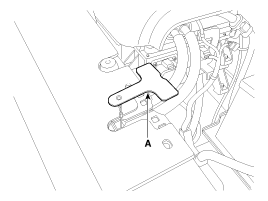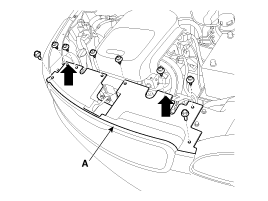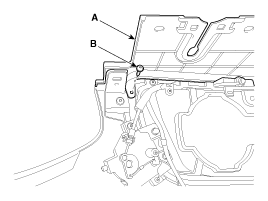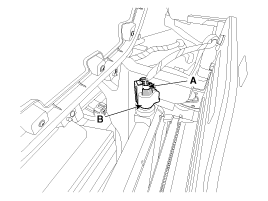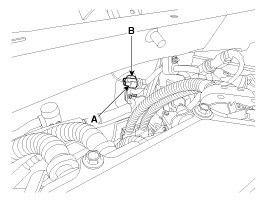Kia Soul EV: Heat Pump / Refrigerant Temperature Sensor Repair procedures
Kia Soul EV (PS EV) 2015-2020 Service Manual / Heating,Ventilation, Air Conditioning / Heat Pump / Refrigerant Temperature Sensor Repair procedures
| Inspection |
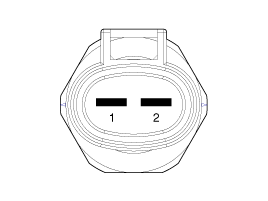
| 1. Vcc | 2. Ground |
Check the voltage between terminals 6 and 7.
| 1. |
Using the tester, check the resistance between terminals 1 and 2.
| ||||||||||||||||||||||||||||||||||||||||||||||||||||||||||||||||||||||||||||
| Replacement |
[Refrigerant Temperature Sensor #1]
| 1. |
Recover the refrigerant with a recovery/ recycling/ charging station.
|
| 2. |
Seperate the charge door handle (A).
|
| 3. |
Loosen the clips and bolts on the front bumper upper cover.
|
| 4. |
Lift the front bumper uppser cover (A) slightly. |
| 5. |
Remove the front bumper upper cover (A) after loosening the mounting screw (B) on the side.
|
| 6. |
Remove the refrigerant temperature sensor #1 (B) after disconnecting the refrigerant temperature sensor #1 connector (A).
|
| 7. |
Install in the reverse order of removal.
|
[Refrigerant Temperature Sensor #2]
| 1. |
Recover the refrigerant with a recovery/ recycling/ charging station.
|
| 2. |
Remove the refrigerant temperature sensor #2 (B) after disconnecting the refrigerant temperature sensor #2 connector (A).
|
| 3. |
Install in the reverse order of removal.
|
 Refrigerant Temperature Sensor Description and Operation
Refrigerant Temperature Sensor Description and Operation
Description
Monitors refrigerant temperature in A/C duct and sends resistance data to A/C controller. (same as the thermistor)
Temperature and resistance is inversely proportioned. ...
 Inner Condenser Components and Components Location
Inner Condenser Components and Components Location
Components Location
1. Inner Condenser
...
Other information:
Kia Soul EV (PS EV) 2015-2020 Service Manual: Electric A/C compressor Specifications
Specification ModelESC33nMotorBLDC MotorControl TypeCANCompression TypeScrollCapacity33cc/revOperating Voltage Range190~320VRated Voltage288VMount TypeBracket Mounting, 4 Point Mounting ...
Kia Soul EV (PS EV) 2015-2020 Service Manual: Rear Glass Repair procedures
Removal • In order to remove the rear glass, use the tools shown in the following figure: [Tooling Diagram] Square wire Insert-type wire grip [Tooling Assembly Diagram] • Insert and affix square wire into the insert hole of the wire grip . ...
Copyright © www.ksoulev.com 2020-2025



